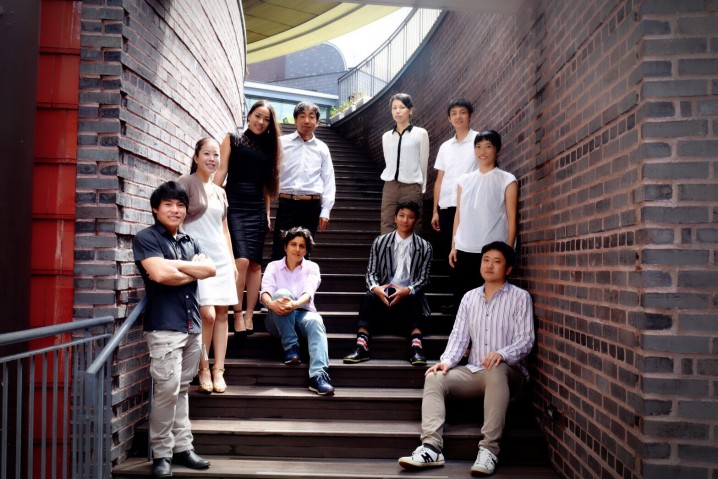Plant Epigenetics Unit
Assistant Professor Hidetoshi Saze
Abstract
Epigenetic Regulation of Genes and Transposable Elements in Plants
We are trying to understand epigenetic mechanisms for regulation of gene and transposon activities in the genomes of model plant systems such as Arabidopsis thaliana and rice, using genetic, biochemical and genomic approaches. In addition, we are working on a research project called "functional Okinawan rice project” supported by Okinawa prefecture, in which we are producing a functional rice strain for Okinawa using molecular breeding techniques.
1. Staff
- Hidetoshi Saze, Assistant Professor
- Yuji Miyazaki, Researcher
- Kenji Osabe, Researcher
- Matin Miryeganeh, Researcher
- Yoshiko Harukawa, Technical Staff
- Saori Miura, Technical Staff
- Yasuka Shimajiri, Technical Staff
- Yoko Fujitomi, Research Administrator
- Nino Espinas, Student
- Tomohito Wauke, Student
2. Collaborations
2.1 Theme: Analysis of transposable elements in plant genomes
- Type of collaboration: Joint research
- Researcher:
- Prof. Shohei Takuno, Department of Evolutionary Studies of Biosystems School of Advanced Sciences, SOKENDAI
- Prof. Hidetaka Ito, Faculty of Science, Hokkaido University, Japan
- Prof. Ngoc Tu, LE, JAIST, Japan
2.2 Theme: Differential DNA methylation of genes and transposons
- Type of collaboration: Joint research
- Researcher:
- Prof. Tetsuji Kakutani, National Institute of Japan
3. Activities and Findings
3.1 Epigenetic Regulation of intragenic transposable elements in plants
We previously reported that in the model plant Arabidopsis thaliana, intragenic TEs are often marked by repressive epigenetic modifications within actively transcribed regions (Saze et al., 2013), and that the repressive state of intragenic TEs is critical for proper splicing and transcription of associated genes (Le et al., 2015). We are currently investigating the molecular mechanisms regulating the maintenance of intragenic heterochromatin especially formed within intron of active genes. We further study other plants with larger genomes such as rice, where a larger number of heterochromatic intron are found compared with the Arabidopsis genome (Figure 2). Our study suggest that epigenetic regulation of intronic TEs are essential for plant genomes.
Figure 1. An intronic TE associated with heterochromatic epigenetic marks within the actively transcribed gene AT3G05410 in Arabidopsis. Top to bottom tracks: RNA-sequencing reads (green) in wild-type Columbia, DNA methylation at CpG (blue), CHG (light blue), CHH sites (pink), chromatin immunoprecipitation hybridization signals of H3K9me2 in wild-type Col (blue), small RNAs (magenta), and Arabidopsis gene model. A retrotransposon ATLINE2 is inserted in the antisense orientation relative to AT3G05410. Adapted from To et al, Plant Physiol., 2015.
Figure 2. Heterochromatic introns in the genomes of Arabidopsis and rice. The figure is adapted from Saze et al. (2013). A, Proportion of methylated cytosine at CHG sites compared among introns of different length. The value was derived from the sum of mapped cytosines in each class. Long introns tend to have more CHG methylation in both Arabidopsis and rice. B, The rice genome contains many more long heterochromatic introns than the Arabidopsis genome. Red and blue dots represent introns of Arabidopsis and rice, respectively.
3.2 Okinawa Functional Rice Project
Since FY2012, we have been working on the “functional rice project in Okinawa”, supported by the Research & Development Cluster program of Okinawa Prefecture. The rice strain, “Amiromochi,” accumulates digestion-resistant starch that is not readily catabolized to glucose. This trait could be useful to improve or prevent life-style-related diseases, such as obesity and diabetes, which are serious problems in Okinawa as well as the lest of the world. We are conducting field tests at an experimental farm in Nago, Okinawa, where we are examining yields and other agricultural traits of the candidate strains, and trying to resister the rice as a new strain from Okinawa (Figure 3).
4. Publications
4.1 Journals
- Ito T, Tarutani Y, To TK, Kassam M, Duvernois-Berthet E, Cortijo S, Takashima K, Saze H, Toyoda A, Fujiyama A, Colot V, Kakutani T. Genome-wide negative feedback drives transgenerational DNA methylation dynamics in Arabidopsis. PLoS Genet. (2015) Apr 22;11(4):e1005154. doi: 10.1371/journal.pgen.1005154.
- Ito H, Kim JM, Matsunaga W, Saze H, Matsui A, Endo TA, Harukawa Y, Takagi H, Yaegashi H, Masuta Y, Masuda S, Ishida J, Tanaka M, Takahashi S, Morosawa T, Toyoda T, Kakutani T, Kato A, Seki M. A Stress-Activated Transposon in Arabidopsis Induces Transgenerational Abscisic Acid Insensitivity. Sci Rep. (2016) Mar 15;6:23181. doi: 10.1038/srep23181.
4.2 Books and other one-time publications
- (Review) To TK, Saze H, Kakutani T. DNA Methylation within Transcribed Regions. Plant Physiol. (2015) Aug;168(4):1219-25. doi: 10.1104/pp.15.00543.
4.3 Oral and Poster Presentations
- Saze H. (Poster presentation) Epigenetic Regulation of Repeats in Intronic Region in the Arabidopsis thaliana genome. The 9th annual meeting of the Japanese society for Epigenetics, Gakujyutu Sogo center, Tokyo, Japan, May 25-26 (2015).
- Saze H. (Invited lecture) Introduction to Epigenetics. Graduate School of Life and Environmental Science, Osaka Prefecture University, Osaka, Japan. July 8-9 (2015).
- Saze H. (Invited Seminar) Epigenetic control of genes and transposable elements in Arabidopsis. RIKEN, Yokohama, Japan, Sep 8 (2015).
5. Intellectual Property Rights and Other Specific Achievements
Award: Food Action Nippon Award 2015. (Research and development) The functional rice project in Okinawa.
6. Meetings and Events
6.1 (Seminar) Histone variants control nuclear organization and genome expression
- Date: August 28, 2015
- Venue: OIST Campus Lab1
- Speaker: Prof. Frederic Berger, Senior Group Leader, Gregor Mendel Institute of Molecular Plant Biology, Vienna, Austria
7. Other
Nothing to report.






